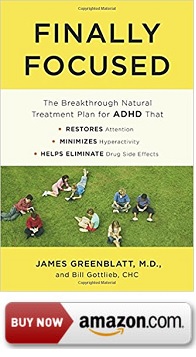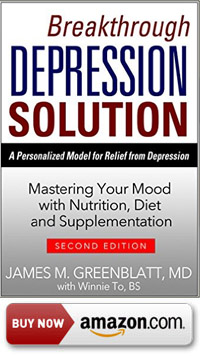Dr. James Greenblatt, Former Chief Medical Officer, Monte Nido Walden
As the former Chief Medical Officer for Monte Nido Walden, Dr. James M. Greenblatt provided medical management, leadership, and oversight of Walden’s eating disorder programs. Working with thousands of children, adolescents and adults, Dr. Greenblatt found that each individual has a unique biochemical profile, range of behaviors and treatment needs. He has since retired from his position at Monte Nido Walden.
Dr. Greenblatt is board-certified in child and adult psychiatry. He received his medical degree and completed his adult psychiatry residency at George Washington University in Washington, D.C. He completed a fellowship in child and adolescent psychiatry at Johns Hopkins Medical School. In addition, Dr. Greenblatt is a clinical faculty member in the psychiatry department at Tufts Medical School. He lectures extensively throughout the United States and Canada on integrative therapies for mental health.
He is the author of several books, including: “Answers to Anorexia,” which draws on his many years of experience and expertise in integrative medicine and treating eating disorders, “The Breakthrough Depression Solution,” which outlines a personalized nine-step method for beating the physical causes of depression; “Answers to Binge Eating,” which confronts a mistaken understanding of why people struggle with weight management and introduces biological solutions for rebalancing appetite and eating patterns; and “FINALLY FOCUSED,” which helps parents understand and eliminate the risk factors around their child’s ADHD symptoms.
Books By Dr. James Greenblatt
FINALLY FOCUSED
ADHD – a disorder affecting 7 million American children and 8 million adults – is not a “behavior” or “discipline” problem, but a medical disorder in which nutritional, neurological, genetic and other factors imbalance the brain, causing imbalanced behavior. To restore balance, every person with ADHD requires unique natural and medical treatments.
FINALLY FOCUSED provides those treatments. Each chapter is organized as a step-by-step healing plan, in which Greenblatt first helps parents understand the factors underlying their child’s ADHD symptoms – and then shows them how to eliminate those factors, one by one. (Adults with ADHD can do the same on their own.) If medication is necessary, the Plus-Minus Healing Plan can minimize or even eliminate side effects.
Answers To Binge Eating
In Answers to Binge Eating, respected psychiatrist and eating disorder expert Dr. James Greenblatt explains how appetite is controlled by the brain’s neurochemical systems, which rely on specific proteins for optimal functioning.
The New Hope model described in this book combines the best in traditional and complementary approaches for recovery from appetite disturbances, food addiction, and binge eating. While dieting providers a temporary fix, this book will offer a permanent solution based on scientific research to help you reclaim a healthy appetite with food.
Following the New Hope model, you will find your answers to appetite control and get off the roller-coaster ride of food addiction.
The Breakthrough Depression Solution
The Breakthrough Depression Solution offers patients and their families’ new hope for sustained recovery from depression.
Depression, a disabling illness that threatens to become the major cause of disability worldwide by the year 2020, is surprisingly common, affecting over 15 million individuals in the United States alone. But the statistics regarding recovery are dismal. Standard treatment for depression successfully eliminates symptoms in only 33% of patients, and in roughly 70% of those with depression, it recurs.
In The Breakthrough Depression Solution, Dr. Greenblatt offers a new approach to this devastating and debilitating illness grounded in personalized medicine. The fundamental premise of this approach focuses on medicine tailored to each individual. Just as personality and appearance is unique, so are the factors that contribute to depression. Focusing on personalized medicine, Dr. Greenblatt concentrates on nutrition, genetics, stress, and when needed, technology to ensure that medications and treatment are targeted towards individual biochemistry. By identifying and addressing all the factors that contribute to depression, depression can be successfully treated!
Answers to Anorexia
Answers to Anorexia offers patients and families new hope for the successful treatment of this serious, frustrating, and enigmatic illness. It proposes the first new treatment plan for anorexia in fifty years.
Anorexia is a medical illness of starvation that causes malnutrition in the body and the brain. This self-starvation disease affects approximately 1-5% of young women in the U.S., (and is increasingly common among middle-aged women as well as men).
While psychiatry treats major psychiatric illness with medications – not one drug is FDA-approved to treat anorexia! Antidepressants are commonly prescribed, but have been proven ineffective for treating anorexia. Answers to Anorexia addresses the challenge of successful treatment by providing an integrative medicine approach to this devastating illness.
Answers to Anorexia offers readers highly accessible information that may be helpful as either self-help or as an adjunct to professional treatment. It provides a holistic treatment plan involving an integrative medicine approach for men and women with anorexia. The treatment plan centers on restorative nutrition and precise medication for the many symptoms and illnesses that often accompany this life-threatening disease such as depression and anxiety. To be successful, Dr. Greenblatt explains, treatment needs to correct the physical damage and brain dysfunction of malnutrition.
Speaking Engagements and Events
Blog Posts by Dr. James Greenblatt
Food Freedom
I was with some friends and their kids this weekend and we were cooking and making various types of food. I love being with friends and seeing their recipes. When the cooking was done we all sat down to eat, including my friends toddler. My friend sat her daughter in her high chair and we all began to eat all the food that we cooked. Her little daughter was taking bite after bite and saying “yummy”, “more”, “good”! She was enjoying every bite of food that went in her mouth. Everyone was so free and having a special time and enjoying wonderful, delicious food and making special memories.
5 Ways to Love the Skin You’re In
Confidence is key in living life to the fullest, and these are my five ways to love the skin you’re in.
Has Your Appetite Gone Wild?
You might have thought appetite could be conquered through willpower and discipline, but science is now revealing that it is not so simple. Disordered eating results from complex interactions between genetics, hormones, vitamins, minerals, amino acids, stress and personal habits. Moreover, the processes in the brain that perpetuate disordered eating are outside our conscious control.
Common Health Problems When Recovering from Eating Disorders and Type 1 Diabetes
When I first started eating disorder treatment in 2008, I had an idea of what it would be like: I would go see a therapist for a month or so, they would tell me what was wrong with me, instruct me on how to fix it, and I would magically stop using eating disorder symptoms. I expected I would be done with treatment in a month or two.
Are You Addicted to Food? 7 Questions to Ask Yourself
Psychiatry determines whether a person is dependent on alcohol or another drug by asking patients seven basic questions. These questions are based on The Diagnostic and Statistical Manual of Mental Disorders (DSM), which is the standard reference used by psychiatrists around the world for diagnosing and categorizing mental and emotional problems. The DSM establishes criteria related to tolerance, withdrawal, difficulty controlling use, desire to cut down, and specific negative consequences. It defines a person substance-dependent if he or she answers YES to three or more of the seven questions. Here I have adapted these questions to focus specifically on food.
Getting Off The Food Rollercoaster
Historically, our relationship with food has rested on the balance of our need to eat and the availability of food: the biological imperative to eat—hunger, and the physical ability to satisfy that imperative. The interplay between hunger and being satisfied is “appetite.”





